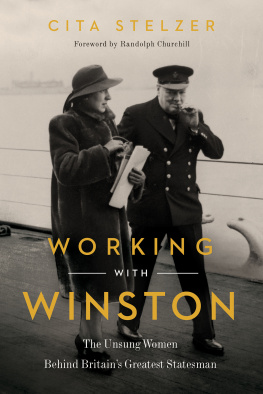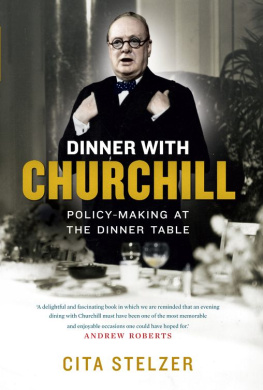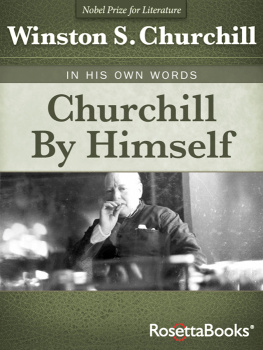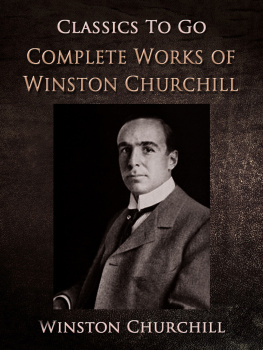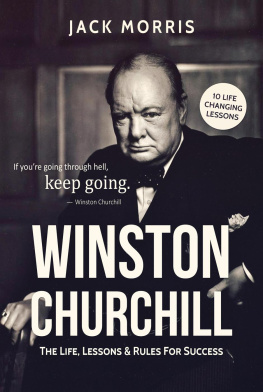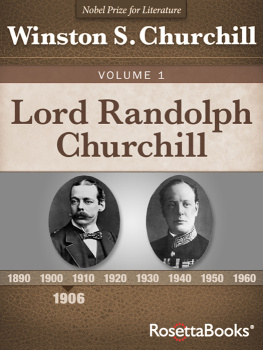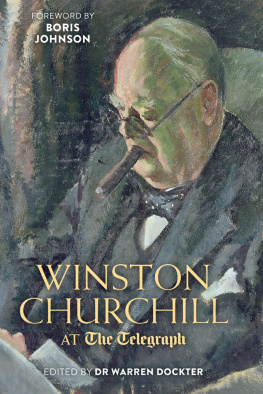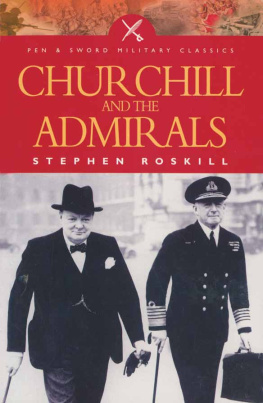Contents

ALSO BY CITA STELZER
Dinner with Churchill
WORKING
WITH
WINSTON
The Unsung Women
Behind Britains Greatest Statesman
CITA STELZER

PEGASUS BOOKS
NEW YORK LONDON
W ORKING WITH W INSTON
Pegasus Books, Ltd.
148 West 37th Street, 13th Floor
New York, NY 10018
Copyright 2019 by Cita Stelzer
First Pegasus Books hardcover edition May 2019
All rights reserved. No part of this book may be reproduced in whole
or in part without written permission from the publisher, except by reviewers
who may quote brief excerpts in connection with a review in a newspaper, magazine,
or electronic publication; nor may any part of this book be reproduced, stored in a
retrieval system, or transmitted in any form or by any means electronic, mechanical,
photocopying, recording, or other, without written permission from the publisher.
ISBN: 978-1-64313-019-4
For Irwin, once again, and always
Every biographer of a public figure who depends on
secretarial help, can only benefit by tracking down those
often silent witnesses who sat at the receiving end of their
subjects voice, and were witness to the aspirations, shortcomings
and strivings of public life.
Martin Gilbert, In Search of Churchill.
Throughout my work I was conscious of how Churchills
extraordinary productivity depended in such large measure
upon those unsung labourers [the secretary shorthand
typists] in the Churchill vineyard.
Martin Gilbert, In Search of Churchill.
It took a nineteenth-century man traditional in habit,
rational in thought, conservative in temper to save the
twentieth century from itself Totalitarianism came
and went And who is the hero of that story? Who slew
the dragon? Above all, victory required one man without
whom the fight would have been lost at the beginning.
It required Winston Churchill.
Charles Krauthammer
Like many others in all parts of the globe, I regard you as
the greatest Englishman in your countrys history and the
greatest statesman of our time, as the man whose courage,
wisdom and foresight saved his country and the free
world from Nazi servitude.
David Ben-Gurion
His genius often outranged lesser mortals, to his cost.
This was his fatal flaw.
Barry Gough
CONTENTS


M UCH HAS BEEN written about my great-grandfather and of the important world leaders, politicians and high-ranking military officers with whom he worked. But to maintain the pace at which he worked as an historian, painter, parliamentarian, cabinet minister and war leader, he required a vast staff. When Churchill strode the world stage, the secretarial and typing staff positions were inevitably filled by women, because during the most notable part of his career most men were in the military or in war service. Many of these female secretaries and shorthand typists, although extraordinarily talented and invaluable to Churchill in enabling him to live and work a full life with as little friction and annoyance as possible, remain unheralded.
Helping Churchill to persevere was a small army of hard-working, skilled women whose stories have come to light in a series of oral histories stored in the wonderful archives at Churchill College, Cambridge. Cita Stelzer has mined this source, giving us a view of my great-grandfather only hinted at in scattered journals until now. This is not a report on how Churchill behaved under the glare of publicity, nor when on his best behaviour dealing with his generals and allies. This is Churchill at work, as seen, day-to-day, under severe stress from outside events and self-imposed deadlines to produce the vast volume of histories that he somehow managed to compose during his Wilderness Years, as prime minister during the war, as Leader of the Opposition, and once again as prime minister. Here also is Churchill at play, usually painting and all beautifully described by Stelzer.
That his work habits were eccentric there is no doubt. Stelzer describes the start of every day: a meeting in his bedroom promptly at 8 a.m. to read the papers and dictate his famous Action This Day memoranda on everything from the conduct of the war to the bricks he would need for his next construction project. Secretaries scribbling, military officers talking, a budgie flying about and landing on any available head, including his own, cigar lit, cats being petted, telephone ringing a veritable circus. All managed with calm precision over the years by a succession of women whose talents Stelzer so well describes.
These women somehow managed to have a complete office set up for Churchill wherever he travelled. Work never stopped and these exceptional women never stopped taking down, as it was called, keeping him in control of the government. Churchill was demanding; everything had to be ready whenever he arrived, things organized just as they had been at his beloved Chartwell and in Downing Street. And at home, fish had to be fed, dogs walked, financial records kept, appointments made and unmade, travel plans set and re-set.
And he could be impatient at times. But because any flashes of impatience were immediately followed by a smile and a soft word, these women adored him. Years after their employment ended they would come back to help their replacements in moments when the work became unmanageable.
I was really touched to be asked to write this foreword. The Churchill family can never repay the debt that we owe those remarkable ladies that supported my great-grandfather. It has been wonderful to know some of them as friends.
I had the particular privilege to know from a young age the wonderful Grace Hamblin. Grace worked with my great-grandfather and Clementine Churchill from the 1930s to the 1960s, thereafter becoming the first administrator at Chartwell. She often recounted to me how, after taking dictation late at night, she would walk through the darkness back to her home in Crockham Hill on unlit paths and return in the morning with the proofs from the night before. It is fair to say that Grace and many others dedicated their lives to Churchill. I asked Grace why she did the remarkable work she did and the impossible hours. She said: We all knew that what Winston was doing was so important we felt compelled to give him that support. Lady Williams Jane Portal as she was then and others still provide a great link with Churchill. In 2016 at the Sir Winston Churchill Award Dinner in London the late, great Robert Hardy recited Churchills eightieth birthday speech in Westminster Great Hall. Jane, who attended the dinner, was completely taken aback as she had typed that speech and gone through all the proofing with Churchill.
This dedication to the Churchill family continues to this day. In 1964 Nonie Chapman came to help Lady Churchill. She continued working for Clementine until her death in 1977, whereupon Nonie worked for Lord and Lady Soames until Mary died in 2014. Not being one to retire, Nonie is now found volunteering at Chartwell on a regular basis. She had helped Clementine set up Chartwell for the public opening and now joins the 400 volunteers who lovingly care for Churchills legacy and make every visit to Chartwell so special.
I am thrilled that the spotlight is being put on these remarkable women who played their full part in preserving our freedom by ensuring the lions roar was heard.

